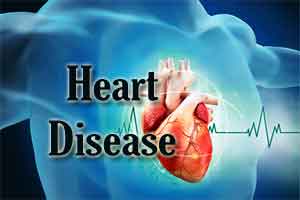- Home
- Editorial
- News
- Practice Guidelines
- Anesthesiology Guidelines
- Cancer Guidelines
- Cardiac Sciences Guidelines
- Critical Care Guidelines
- Dentistry Guidelines
- Dermatology Guidelines
- Diabetes and Endo Guidelines
- Diagnostics Guidelines
- ENT Guidelines
- Featured Practice Guidelines
- Gastroenterology Guidelines
- Geriatrics Guidelines
- Medicine Guidelines
- Nephrology Guidelines
- Neurosciences Guidelines
- Obs and Gynae Guidelines
- Ophthalmology Guidelines
- Orthopaedics Guidelines
- Paediatrics Guidelines
- Psychiatry Guidelines
- Pulmonology Guidelines
- Radiology Guidelines
- Surgery Guidelines
- Urology Guidelines
MRI is best for detect structural and functional heart disease

Doctors might be able to better detect any disease or disorder that involves inflammation thanks to a new MRI imaging technology co-developed by faculty at Binghamton University, State University of New York.
Amber Doiron, research assistant professor in the biomedical engineering department at Binghamton University, along with a fellow researcher at Temple University, has developed a new MRI imaging technology that, when injected, could help doctors detect inflammation in the body that is indicative of heart disease.
"Doctors use factors like blood pressure and cholesterol level to get an idea of a patient's risk. Then they use plaque size as a general measure of whether a person has the disease," said Doiron. "But there's a fairly poor correlation between plaque size and heart attack or stroke."
"We created a nanoparticle-based contrast agent for MRI," added Doiron. "It can theoretically be injected and, when activated, we can actually see areas of inflammation on the MRI scan."
Being able to detect inflammation is how Doiron's study will help doctors predict the effects of heart disease with better accuracy. However, the nanoparticle can also be used to pick up other types of inflammation throughout the body. Inflammation is a common factor in many other diseases, so potentially, "any inflammatory disease could be detected in this way," said Doiron.
The list of diseases or disorders related to inflammation is a long one. It includes common ones like allergies and asthma, as well as the more complex like hepatitis and transplant rejection.
With continued research, this study could help doctors detect inflammatory diseases sooner and pinpoint where the inflammation is in the body via the MRI scan, said Doiron.
Doiron and her collaborator received a two-year, $418,000 grant from the National Institute of Biomedical Imaging and Bioengineering to support this research.
For more details click on the link: http://dx.doi.org/10.1016/j.colsurfb.2017.07.025

Disclaimer: This site is primarily intended for healthcare professionals. Any content/information on this website does not replace the advice of medical and/or health professionals and should not be construed as medical/diagnostic advice/endorsement or prescription. Use of this site is subject to our terms of use, privacy policy, advertisement policy. © 2020 Minerva Medical Treatment Pvt Ltd